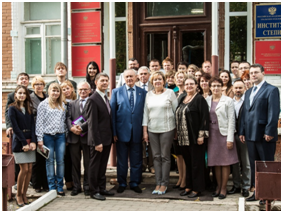The Institute for Cellular and Intracellular Symbiosis UB RAS
The Institute for Cellular and Intracellular Symbiosis UB RAS is the leading specialized microbiological research institution in the South Urals, which has a modern instrument base and highly qualified scientific personnel. The main goal of the Institute is to carry out fundamental research and applied research in the field of microbiology, infectology and microbial ecology in the following areas: studying the cellular and intracellular symbiosis mechanisms and their regulation by factors of various origins; studying the biological diversity of micro- and macroorganisms in natural and anthropogenic ecosystems communities and developing scientific the basics of environmental objects microecological monitoring; the creation of new medical laboratories technologies based on the micro- and microorganism sinteraction mechanisms study.
The most important research results of the Institute for Cellular and Intracellular Symbiosis UB RAS:
A new science direction is substantiated - “infectious symbology”, which studies the microsymbionts and host interactions during infection under the conditions of their biocommunicative relationships. It became a technological platform not only for studying infectological mechanisms, but also for creating the new synbiotic series drugs.
The concept of associative symbiosis as a multicomponent integrated system has been developed, including: macrosymbiont (host), dominant microsymbiont (normal microflora) and associative microsymbionts (pathogens, conditionally pathogenic microorganisms).
The statement on the organism’scolonization resistance is formulated, which is based on the host organism and autochthonous microflora symbiotic interactions, aimed at maintaining microecological homeostasis.
The microorganisms’ survival mechanisms during bacterial carriage and infectious and inflammatory diseases are deciphered.
The universal concept of the "systemic" endogenous bacterial infections’pathogenesis is justified, risk factors for their development are classified, new approaches to the diagnosis, prognosis, therapy and prevention of this pathology are developed.
As part of the various ecological systems’biological diversity study, an inventory of the human microbiota and natural reservoirs’microorganismscomposition was carried out. New types of protists for science and the Orenburg region have been identified and studied.
For the technology development, the organization of industrial production and the introduction of the new domestic preparation Cycloferon’sready-made dosage forms into medical practice, and the scientific foundations development and the introduction of a set of biomonitoring methods for sustainable environmental and the Volga basin’seconomic development, employees were awarded the Russian Federation Government Prize for Science and Technology.

The Institute is equipped with the following research equipment: MiSeq automatic sequencing system (Illumina, USA), Minion III sequencer (OxfordNanopore, Great Britain), gas chromatography mass spectrometer GCMSNQ8030 (Shimadzu, Japan), binocular microscopes NikonTS2, AxioStar, Axioskope, freeze drying LL 1500 BasicSystem, microbiological analyzer complete with automatic cell colony counting system, Infinity gel documentation system, MultiskanAscent photometer, high performance liquid chromatography equipment Knauf, CFXConnect real-time PCR system (Bio-RadLaboratories USA), T100 nucleic acid amplifier (Bio-RadLaboratories USA); two-channel fluorimeterQuantusPromega (USA), etc.
At the ICIS UB RAS there is the necessary scientific equipment for studying the microorganisms’morphology and physiology, studying symbiotic interactions in natural and artificial systems. The Institute operates a center for the collective use of scientific equipment “Persistence of microorganisms”, using modern technology for sequencing a new generation, the services of which are in great demand by third-party scientific organizations both in Russia and abroad. “The collection of non-pathogenic and pathogenic microorganisms” has been created at the Institute, containing unique strains of normal human microflora’s and the environment’s bacteria, which is a bioresource center for creating drugs suitable for the infectious diseases treatment and prevention.
The Institute undertakes joint research with the University of Pisa (Italy), the Canadian Institute for Advanced Research (Canada), the Arkansas University (USA), and K. Zhubanov Aktobe Regional State University (Republic of Kazakhstan) and the D.K. Zabolotny Institute of Microbiology and Virology NAS of Ukraine. The Institute staff are members of a scientific societies: International Social Society of Protistologists (Great Britain), International Social Society for Salt Lake Research (USA); International Society for Extremophiles (Germany), American Society for Microbiology (USA).